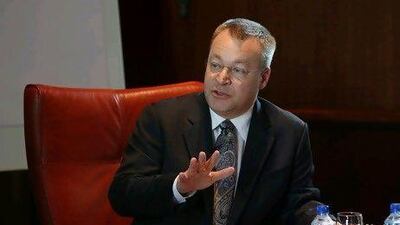Nokia, the largest mobile phone maker in the world, plans to increase its investment across the Middle East to combat declining handset sales in the region.
Stephen Elop, the chief executive of Nokia, declined to comment on the amount the Finnish handset maker was looking to invest but said the Middle East wasimportant to the company.
"Regions that have the opportunity for disproportionate growth attract disproportionate amounts of spending. The Middle East is a good example of that," Mr Elop said.
Although Nokia sold about 111.5 million devices last year, its market share has plunged following advances from Apple and Google's Android platform.
Nokia mobile market share declined to 28.9 per cent last year from 36.4 per cent in 2009, according to Gartner, a technology consultancy.
The company intends to attract new buyers for its devices following a tie-up with Microsoft to install the Windows Phone 7 platform on its handsets later this year, Mr Elop said.
He said there were a number of products and services specific to the Middle East that Nokia planned to introduce later this year as part of the company's "local experience" strategy.
"It's our belief that to be successful in any region, we need to take strong steps to provide local content to make partnerships with local services and to make products that are sensible," Mr Elop said.
"There are examples where we are not along as far as I would like - elements of our services [are] not in Arabic. Given the opportunity and overall mission, this is something we will address directly."
Mr Elop said the company was currently evaluating Microsoft's mobile platform for a possible tablet device.
Tablets, such as Apple's iPad and the Samsung Galaxy Tab, are a major market and one that is expected to quadruple next year from the 17 million units sold last year, industry analyst say.
"We are presented with multiple options in the slate tablet space," Mr Elop said. "My challenge is to continue the work that we're doing because the market opportunity is much broader than smartphones but it needs to be uniquely Nokia and needs to stand for something that's different."

